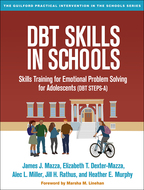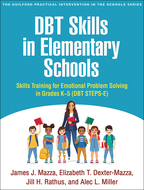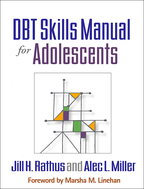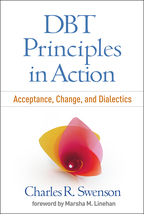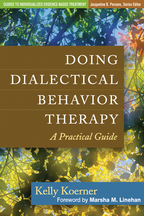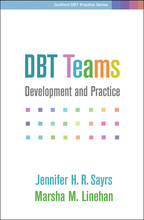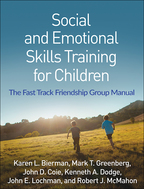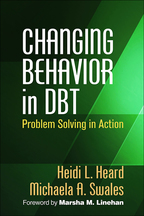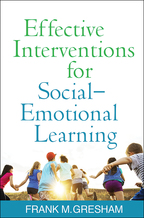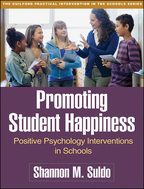DBT Skills in Schools
Skills Training for Emotional Problem Solving for Adolescents (DBT STEPS-A)
James J. Mazza, Elizabeth T. Dexter-Mazza, Alec L. Miller, Jill H. Rathus, and Heather E. Murphy
Foreword by Marsha M. Linehan
A Paperback Originale-bookprint + e-book
A Paperback Original
orderJune 13, 2016
ISBN 9781462525591
Price: $71.00 490 Pages
Size: 8" x 10½"
Check out a special package offer including this title!

Check out Guilford Digital for DBT, the app that streamlines key aspects of DBT delivery and skills training, from customizable diary cards to Marsha Linehan's complete skills library.
| In this video, James Mazza and Elizabeth Dexter-Mazza, discuss four effective DBT strategies that can be used by teachers, parents, and students. |  |
Sign up for emails on upcoming titles by James J. Mazza (with special discounts)!
“Each lesson is described thoroughly, including required materials, preparation instructions, lesson overviews, and timelines. The authors skillfully weave the philosophical background of dialectics into the first few lessons using language and issues that adolescents can relate to. The intention of this book is not just to be a resource, but to be a how-to book. The authors succeed in providing simple-to-understand, easy-to-implement lessons throughout DBT STEPS-A….This book would be a valuable addition to any middle or high school social worker’s library.”

—School Social Work Journal
“The lessons and the accompanying handouts are impressive….As a practitioner who has used DBT with adolescents and adults as well as working with adolescents in groups for over 35 years, I highly recommend this manual.”

—Social Work with Groups
“Consistent with DBT and dialectics, the authors have found an ingenious way of expanding the reach and implementation of DBT skills to the universal population of adolescents in educational settings. The DBT STEPS-A curriculum offers a fabulous upstream approach for all adolescents to develop DBT skills and reduce the likelihood of emotionally dysregulated behaviors….Your ability to take this book and use it to teach schoolchildren a wealth of effective life and emotion regulation skills has the possibility of helping more than you can imagine.”

—from the Foreword by Marsha M. Linehan, PhD, ABPP, Professor and Director Emeritus, Behavioral Research and Therapy Clinics, University of Washington; developer of DBT
“A truly wonderful curriculum to support social–emotional learning (SEL). The authors give school personnel needed tools to teach SEL skills both universally and to targeted high-risk students. The manual is clear, concise, and comprehensive, while providing enough flexibility that school-based mental health professionals and teachers can adapt it to their schools' particular needs. This book is an important resource for anyone who is charged with helping students to become more emotionally adept, manage stress, and live more balanced lives.”

—Michael Hollander, PhD, Director of Training and Consultations, 3East DBT Services, McLean Hospital; Department of Psychiatry, Harvard Medical School
“The authors of this groundbreaking book—all DBT experts—have done something no one else has done before: created a curriculum based on DBT skills that can be used with a broad range of middle and high school students. The curriculum is presented in a highly structured, useful, and practical manner. As most mental health services for youth are delivered in schools, this book should be required reading for all school-based mental health professionals, teachers, and school administrators.”

—David N. Miller, PhD, Division of School Psychology, University at Albany, State University of New York
“DBT STEPS-A offers school administrators and school-based mental health professionals a skills-based emotion regulation curriculum for students in general education and/or alternative school-based settings. The structured lesson plans and student worksheets facilitate implementation for general education teachers and school-based personnel. The curriculum is ideal for use at the levels of both prevention and intervention in the framework of a multi-tiered system of support. The book clearly spells out the theoretical basis and rationale for the approach, and shows how to teach DBT skills in a way that students and parents can understand. Schools are often at a loss for how to help students with varying levels of complex social-emotional and behavioral problems—DBT STEPS-A addresses this need.”

—Ameet N. Boleigh, EdS, NCSP, school psychologist, Aiken County Public School District, South Carolina
“I have used DBT STEPS-A the last 2 years with sixth, seventh, and eighth graders. In my 36 years as an educator I have used many programs, and this one is the most comprehensive and powerful. I surveyed one of my eighth-grade classes, and 96% of the students said they would use the skills they learned. Imagine students learning that their thoughts and feelings can lie to them in a crisis situation, and gaining the skills to successfully deal with their issues. My district and others cannot afford to be without DBT STEPS-A.”

—Richard Jones, MEd, school counselor, Maple Grove School, Battle Ground, Washington
—School Social Work Journal
“The lessons and the accompanying handouts are impressive….As a practitioner who has used DBT with adolescents and adults as well as working with adolescents in groups for over 35 years, I highly recommend this manual.”
—Social Work with Groups
“Consistent with DBT and dialectics, the authors have found an ingenious way of expanding the reach and implementation of DBT skills to the universal population of adolescents in educational settings. The DBT STEPS-A curriculum offers a fabulous upstream approach for all adolescents to develop DBT skills and reduce the likelihood of emotionally dysregulated behaviors….Your ability to take this book and use it to teach schoolchildren a wealth of effective life and emotion regulation skills has the possibility of helping more than you can imagine.”
—from the Foreword by Marsha M. Linehan, PhD, ABPP, Professor and Director Emeritus, Behavioral Research and Therapy Clinics, University of Washington; developer of DBT
“A truly wonderful curriculum to support social–emotional learning (SEL). The authors give school personnel needed tools to teach SEL skills both universally and to targeted high-risk students. The manual is clear, concise, and comprehensive, while providing enough flexibility that school-based mental health professionals and teachers can adapt it to their schools' particular needs. This book is an important resource for anyone who is charged with helping students to become more emotionally adept, manage stress, and live more balanced lives.”
—Michael Hollander, PhD, Director of Training and Consultations, 3East DBT Services, McLean Hospital; Department of Psychiatry, Harvard Medical School
“The authors of this groundbreaking book—all DBT experts—have done something no one else has done before: created a curriculum based on DBT skills that can be used with a broad range of middle and high school students. The curriculum is presented in a highly structured, useful, and practical manner. As most mental health services for youth are delivered in schools, this book should be required reading for all school-based mental health professionals, teachers, and school administrators.”
—David N. Miller, PhD, Division of School Psychology, University at Albany, State University of New York
“DBT STEPS-A offers school administrators and school-based mental health professionals a skills-based emotion regulation curriculum for students in general education and/or alternative school-based settings. The structured lesson plans and student worksheets facilitate implementation for general education teachers and school-based personnel. The curriculum is ideal for use at the levels of both prevention and intervention in the framework of a multi-tiered system of support. The book clearly spells out the theoretical basis and rationale for the approach, and shows how to teach DBT skills in a way that students and parents can understand. Schools are often at a loss for how to help students with varying levels of complex social-emotional and behavioral problems—DBT STEPS-A addresses this need.”
—Ameet N. Boleigh, EdS, NCSP, school psychologist, Aiken County Public School District, South Carolina
“I have used DBT STEPS-A the last 2 years with sixth, seventh, and eighth graders. In my 36 years as an educator I have used many programs, and this one is the most comprehensive and powerful. I surveyed one of my eighth-grade classes, and 96% of the students said they would use the skills they learned. Imagine students learning that their thoughts and feelings can lie to them in a crisis situation, and gaining the skills to successfully deal with their issues. My district and others cannot afford to be without DBT STEPS-A.”
—Richard Jones, MEd, school counselor, Maple Grove School, Battle Ground, Washington

